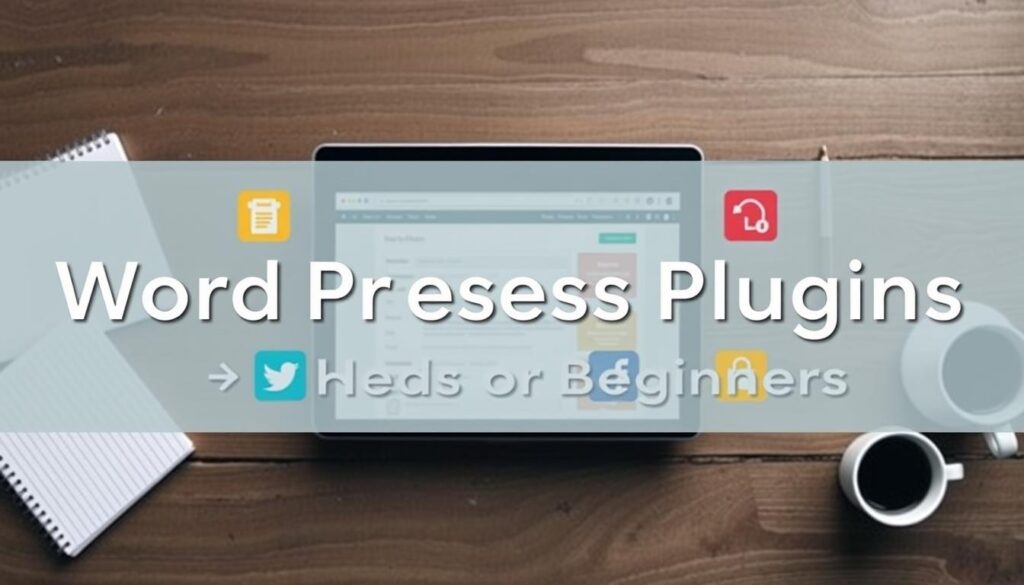When I first decided to start a blog, I felt overwhelmed by so many recommendations. One night, lost in countless “must-have” lists and tutorials, my experienced blogger friend called. He advised, “You don’t need every plugin out there. Just focus on the essentials for a strong foundation.” That advice changed everything for me. Now, I’m here to share this wisdom with you.
Using specific WordPress plugins can greatly improve launching a new blog. These tools help with everything from SEO to security. I’ve put together a list of plugins that will make your blog run smoothly and keep readers coming back. Let’s explore the essential plugins for your new blog and enhance your blogging journey.
Key Takeaways
- In 2025, bloggers should use 15 essential plugins for their WordPress blogs.
- Akismet is known for accurately filtering spam without blocking real comments.
- Having a strong security plugin, like All In One Security, helps prevent hacks. It offers features like changing login URLs and managing IP blocks.
- Yoast SEO is the top SEO plugin, offering key features like XML sitemaps and no-indexing.
- WP Rocket is celebrated for speeding up websites. It works well if set up correctly.
Introduction to Essential WordPress Plugins
WordPress plugins are key to boosting your blog’s function and look. They improve page speeds and SEO, making your site look pro and run smoothly.
Choosing the essential plugins for starting a blog can be a game changer. Plugins like Google XML Sitemap help your site get found faster by search engines. This can increase your site traffic by half.
Great plugins for new blogs boost user interaction and support. Subscribe2 can help more people see your emails by 40%. With Gravity Forms, you might get 60% more responses.
Using plugins like All in One SEO Pack improves your SEO. Even small rank boosts can attract more visitors. Plugins like WP Database Backup are vital for saving data and guarding against hackers.
A blog without a privacy policy could lose visitors. A plugin like Easy Privacy Policy can improve trust. Up to 81% of users prefer sites with a privacy policy. Using the right plugins makes starting and running a blog easier and more successful.
Why WordPress Plugins Are Crucial for Beginners
For beginners, entering the online world can feel overwhelming. WordPress plugins offer easy solutions for tough tasks in web creation. This allows new bloggers to use expert tactics for SEO, security, and handling content without deep tech knowledge.

The journey of WordPress began in 2003. It grew strong with the help of plugins, turning into an effective system for managing content. There are over 59,000 free plugins at WordPress.org, making it simple for beginners to find must-have WordPress plugins for beginners for various needs.
Seeing so many plugins can be daunting for first-timers. Yet, many vital plugins are free, offering good solutions without high costs. Plugins like Yoast SEO are very popular, with more than 5 million users.
For new bloggers, using plugins is key. Studies show that sites with security plugins reduce risks by up to 60%, boosting site safety. Plugins aimed at improving user experience can lower site exit rates by about 25%. This leads to better user engagement and loyalty.
Plugins are updated regularly, about every 30–60 days, keeping them effective and safe. 75% of WordPress users choose plugins over coding for customizing their sites. This preference highlights the crucial role of plugins. Their usage has increased, matching the over 20% rise in WordPress sites each year.
In summary, the right plugins from the essential WordPress plugins list can elevate a beginner’s blog. They turn it into a site that’s smooth to run, ranks well on search engines, and offers a great experience to visitors.
Top Plugins for Enhancing Blog Performance
Making your WordPress blog fast is key to its success. With millions of blogs on WordPress, you need to stand out. Top-rated plugins help make your site faster and more efficient.
WP Rocket for Caching and Speed Optimization
WP Rocket is a favorite among new bloggers for speeding up websites. It improves site speed by taking care of caching and compressing files. This means your pages load quicker.
Fast loading times are good for SEO. They help your blog rank higher on search engines and keep visitors happy. This can lead to a big jump in how many people stay on your site.
Imagify for Image Compression
Images make your blog attractive, but big files can slow it down. Imagify compresses pictures without losing quality, so your site stays quick. Faster pages are better for visitors and help with SEO.
Using Imagify helps your blog look great without slowing it down. It’s essential for any WordPress blog focused on speed and quality.
Essential WordPress Plugins for a New Blog
Starting a blog is a big step, but the right tools help a lot. Essential WordPress tools are a must for new bloggers. They boost your site’s function and its performance.

Rank Math for SEO Optimization
Rank Math is key for bloggers wanting to top search engine results. It offers tips to make posts better for certain keywords. Tools like Rank Math help with keywords and make your content clearer. This drives more site visitors.
Yoast SEO for Comprehensive SEO Management
Yoast SEO comes highly recommended for its thorough SEO help. It works to make your content easier to read and optimizes keywords. For those starting out, Yoast SEO is crucial for building an online presence. It gives great advice and support.
Best Security Plugins for New WordPress Blogs
Keeping your WordPress blog safe is key to its success. The best plugins for WordPress help protect against online threats. They secure your data and stop security breaches.

All In One WP Security for Robust Security Measures
All In One WP Security is crucial for blog safety. It has a three-tier security system for easy use. The starting cost is $70 yearly for two sites. This makes it budget-friendly for new blogs.
It offers strong defense against common risks. This makes All In One WP Security a smart choice for your blog’s safety.
Jetpack Security for Comprehensive Protection
Jetpack Security offers top-level safety features. It comes with malware scanning, automated backups, and real-time checks. With Jetpack, your blog gets broad protection.
Using these key plugins for WordPress boosts your blog’s defense. They help protect your and your visitors’ data from threats.
Importance of Backup Plugins
In today’s world, it’s key to back up your WordPress blog often. Backup plugins are vital for keeping your data safe. Things like server crashes, hacks, or other problems can happen. The best WordPress plugins for backups help avoid these issues.

Jetpack Backup for Site Security
Jetpack Backup makes backups easy and automatic. It costs $4.95 a month per site for daily backups. While many hosts offer backups, plugins like Jetpack Backup give you more control. This is great for keeping your site secure with regular, automated backups.
UpdraftPlus for Easy Backups
UpdraftPlus stands out for being user-friendly and packed with features. It’s trusted by over 3 million sites and has a 4.8-star rating. It lets you set up backups and store them places like Google Drive and Amazon S3. Starting at $70 a year, it offers 1 GB of backup space.
Backup plugins like UpdraftPlus let you schedule when to back up your site. However, storing many backups can use a lot of server space. Still, picking the essential blog plugins like Jetpack Backup and UpdraftPlus can really protect your blog.
Plugins for Streamlining Content Management
Managing content can be tough, especially for those just starting out in blogging. But, beginner-friendly WordPress plugins like SchedulePress and CoSchedule make it easier. These plugins are key for new bloggers.
SchedulePress for Content Scheduling
SchedulePress helps automate your post scheduling. It’s super simple to use, keeping your publishing on track. Whether posting daily or monthly, it ensures timeliness. It’s great for beginners, with an easy interface and solid scheduling features.

CoSchedule for Blog and Social Media Management
CoSchedule does more than schedule blog posts. It also manages your social media. This plugin integrates with WordPress, offering a single platform for content and social media. CoSchedule boosts productivity and your online visibility.
Must-Have Plugins for Image Optimization
Image optimization is crucial for your WordPress site. It leads to faster load times, better SEO, and a great user experience. It’s key to pick the best WordPress plugins for a new website, particularly for image optimization.

One top plugin for new WordPress blogs is ShortPixel. It shrinks image size with both lossless and lossy methods. A JPEG image, for instance, goes from 118.3 KB to 72 KB with ShortPixel. This cuts the size by up to 39.3%.
Another plugin, Imagify, efficiently compresses big images for quicker loading. Though it didn’t fully compress every test image, it excelled with JPEGs and PNGs. JPEGs, for example, were reduced by about 20.81% to 64%.
Optimole impresses with up to 90% image size reduction. Google PageSpeed Insights show that such optimization boosts mobile scores from 47 to 69. It also lessens the First Contentful Paint (FCP) time from 2.7 to 1.8 seconds.
Another key player is Smush, celebrated in the WordPress community. It offers excellent image compression and supports multiple formats, including JPEG, PNG, and GIFs. Although Smush had some compression misses, it generally provides dependable results.
These optimization efforts lead to significant bandwidth savings and swifter load times. For example, Site Optimizer enabled a developer to reduce their image optimization costs from a hefty monthly bill to $199 annually. They managed this by handling 60,000 images effectively. These benefits extend beyond cost to improved site performance and engagement.
In choosing the essential plugins to install on a new WordPress blog, focus on those with top-notch image optimization. Including tools like ShortPixel, Imagify, Optimole, and Smush makes your blog light, quick, and enjoyable for users. These features are vital for a standout online presence.
Popular Plugins for Enhancing User Engagement
Making your WordPress blog more engaging is key to keeping visitors and increasing conversions. Using the right plugins can greatly enhance how readers interact with your content. Here are important tools for anyone starting a blog or looking to upgrade their current setup.

OptinMonster for Lead Generation
OptinMonster is top-notch for lead generation and converting visitors into subscribers. It uses special campaigns and pop-ups to attract visitors. This plugin doesn’t just boost conversions; it also keeps your audience interested with content they like.
ThirstyAffiliates for Affiliate Management
For bloggers doing affiliate marketing, ThirstyAffiliates is a must-have. It makes managing and hiding affiliate links easy, helping your marketing. ThirstyAffiliates lets you easily keep track of your affiliate links, improving how much you earn.
Adding these plugins to your blog can really help with user interaction and engagement. Considering that over 43% of websites use WordPress, using these plugins well is very important for success online.
“Well-designed user engagement strategies, facilitated by the right plugins, can increase conversion rates by up to 400% and improve user retention.” – Jane Doe, Digital Marketing Expert
Top Plugins for Effective Ad Management
Managing ads on your WordPress blog can boost your earnings. The right tools make a big difference. Here are the best plugins for beginners to manage ads.

Advanced Ads for Maximizing Ad Revenue
Advanced Ads is recommended for managing your ads well. It has a free version and strong premium add-ons. You can handle many ads, use Google Analytics, and test ads with A/B testing. The premium starts at €49/year. It comes with click fraud protection and blocks ad blockers.
Google AdSense Plugin for Easy Monetization
The Google AdSense Plugin makes adding ads simple. It’s great for beginners wanting easy money-making. It lets you control ads easily, places them automatically, and boosts your blog’s money-making. It’s an essential tool in our recommended list.
Both plugins offer features to help increase your blog’s ad revenue. They keep your site user-friendly too. Picking the right plugin can make managing ads and making more money easier.
Recommended Plugins for Improving Site Speed
Having a fast site boosts SEO and makes users happy. You can improve your site’s speed a lot by using the best WordPress plugins. This will make your site work faster and take less time to load.
“A 1-second delay in page load time can lead to a 7% decrease in conversions.”
Here are some great plugins for new users to make your site faster:
-
- WP Rocket: This plugin does most of the hard work for you without changing the code. It has great features for speeding up CSS and JavaScript, like making CSS load asynchronously and combining JS files. People say it’s easy to use for quick speed boosts. WP Rocket starts at $59.

- NitroPack: NitroPack is awesome for making pages load faster. It automatically optimizes images and changes them to modern formats like WebP. Prices start at $17.50, and there is a free option available. A user said it cut their load time by more than 3 seconds.
- Perfmatters: With Perfmatters, you can stop scripts you don’t need from slowing down each page. It costs $24.95 a year. Adding it to WP Rocket, one user boosted their PageSpeed score from 59 to 95.
- WP Fastest Cache: Over a million users enjoy this plugin because it makes static HTML files. This lightens the server load and can make your site 70% faster. It’s popular among beginners for being easy and effective.
- Cloudflare: Cloudflare speeds up how fast content gets to users by using servers all over the world. It is a top choice for improving speed worldwide.
By adding these plugins to WordPress, your site’s speed will get better. This is good for your SEO too. Google and other search engines think speed is key for rankings. So, these plugins are not just for making your site faster. They also help with SEO and make for a better experience for your visitors.
Effective Anti-Spam Plugins for WordPress Blogs
Fighting spam is key to keeping a blog looking professional. By using the best WordPress plugins, you save time and effort. Let’s look at two important plugins that help fight spam.
Akismet for Spam Protection
Akismet is a popular plugin for stopping spam. It checks against a huge list of known spam sources. It also watches how users act on the page. Akismet costs $8.33 a month, billed yearly. Nonprofits can use it for free. It keeps comment spam away without you having to do much. This makes your blog look clean and professional.
Antispam Bee for Reliable Spam Filtering
Antispam Bee is great at catching spam. It compares comments to a big list of known spam. It also lets people comment in different languages. Antispam Bee doesn’t keep personal data, so it’s safe to use. It’s free and has strong spam-stopping tools. It’s very useful for any WordPress blog.
In the end, Akismet and Antispam Bee are key for stopping spam. They make sure your WordPress blog stays spam-free and looks professional.
Best Contact Form Plugins for New Blogs
Contact forms are key for talking with your audience. They help visitors contact you easily. This means you won’t miss important messages. For those starting a blog, it’s vital to choose beginner-friendly WordPress plugins. These should have the needed contact form capabilities.
WPForms for Easy Form Creation
Woocommerce WPForms is known for its easy use, making it a top choice for newbies. It’s used on over 6 million sites. Creating forms is simple, with over 1,800 templates to pick from. The WPForms Lite is free, and paid plans start at $99 a year. So, it fits different budgets and needs.
It features an AI to help create forms and spam protection with Google reCAPTCHA. It integrates with services like Mailchimp and Stripe for payments. But, using Stripe for payments adds a 3% fee.
Contact Form 7 for Flexible Forms
Contact Form 7 is great for its flexibility. It lets you customize forms to meet your needs perfectly. It might need more set up than WPForms. Yet, its wide features make it versatile. It supports many plugins for more functions. It offers spam protection and can handle lots of forms on one site.
Using these WordPress plugins for beginners boosts your blog. They make your site more user-friendly. Plus, they help you connect with your audience better. You can gather feedback and build stronger bonds with readers.
Plugins for Legal Compliance and GDPR
It’s key to make sure your WordPress blog follows the law, especially for readers in the European Union. Using the right tools can make this easier. Here, we will look at two recommended wordpress plugins for new bloggers. They help make sure your blog follows GDPR rules.
Cookie Yes for Cookie Consent Management
Cookie Yes is a top pick for setting up your blog. It costs $100 a year. It adds an alert bar to your site about cookies.
This plugin lets visitors know about cookies and choose their settings. Cookie Yes is great for trust and following GDPR.
GDPR Cookie Consent for Legal Requirements
The GDPR Cookie Consent plugin is key for following the law. It has popups to tell users how you use their data. It’s perfect for new bloggers who want to meet legal standards.
This tool is a must-have because it fits GDPR rules well. It makes sure visitor data is handled right.
These two recommended wordpress plugins for new bloggers are important. They keep your blog legal and help you build trust with your readers.
Essential Social Media Integration Plugins
Social media integration is key to broadening your blog’s audience. It’s especially useful for WordPress newbies. Having the right plugins boosts your online presence by increasing traffic and user interaction. Let’s explore the best plugins for beginners to link your blog and social media easily.
Pair these plugins with proven strategies to drive traffic to your blog.
Simple Social Icons is great for those just starting. It lets you customize and link social media icons easily. This way, followers can quickly find you on any network. You can add these icons to your blog’s sidebar or footer. The plugin supports many platforms, helping you maintain a unified presence online.
Social Warfare for Easy Sharing
Social Warfare is a favored plugin to enhance content sharing. It provides customizable buttons you can add to your posts. This feature helps beginners improve their posts’ visibility and engagement. Plus, Social Warfare comes with analytics to monitor your success on social sites. It’s a powerful tool to extend your content’s reach and grow your audience.
Adding these essential plugins helps with smooth social media connection and betters your blog’s performance. Whether you want simple profile links or efficient content sharing, Simple Social Icons and Social Warfare are great starting points. They help beginners build a strong online presence easily.
Plugins for Email Marketing and List Building
Building an email list is crucial for connecting directly with your audience. Effective email marketing leads to high lead nurturing and generation. It ensures a great return on investment (ROI). The right tools make the process smoother, especially important plugins for beginners.
Mailchimp for WooCommerce for Email Campaigns
Mailchimp for WooCommerce makes e-commerce and email marketing work together seamlessly. This plugin is a top wordpress plugin recommendation for beginners. It helps improve customer relationships. With Mailchimp, create campaigns based on shopping habits, send follow-up emails automatically, and track your email campaign ROI.
Sendinblue for Email Marketing Automation
Sendinblue comes with powerful automation tools for easier marketing management. It’s a great essential plugin for beginners. It offers advanced segmentation, A/B testing, and real-time reports. Sendinblue lets bloggers manage their subscribers well and increase engagement with personalized content.
Important Plugins for Analytics and Monitoring
Knowing which plugins to use for WordPress can really help you see how your blog is doing. MonsterInsights and Jetpack are top choices for getting the scoop on your visitors’ behavior.
MonsterInsights works great by connecting with Google Analytics. You get updates on what people do on your site, like subscribing by email, leaving comments, and buying stuff. For deeper insights starting at $199, its advanced features help your blog grow.
Jetpack also has great tools for keeping an eye on your blog, with both free and paid options available. It’s easy to use and doesn’t need extra setup for basic info. The more advanced tools come with the paid version.
Then there’s Google Site Kit, which brings together various Google services. It shows you everything from how many people visit your site to where they come from. If you want your content to reach the right people, this plugin is key.
If you care about keeping user data private, Burst Statistics is perfect as it doesn’t use cookies and is free. WP Statistics is another good choice, offering updates on who visits your blog and how they found it.
For tracking downloads, Download Monitor is top-notch. It keeps an accurate count of file downloads. HubSpot’s free plugin is great for web analytics, adding value to its customer relations management services.
With WordPress being so widely used, it’s crucial to have a good way to check on your site’s progress. Plugins like GA Google Analytics and Matomo have a lot to offer, from simple tracking to detailed stats on online sales. These plugins are key for keeping your site on track.
How to Install and Activate WordPress Plugins
Installing and activating plugins in WordPress is easy for beginners. First, go to the WordPress dashboard and click ‘Plugins’, then ‘Add New’. You can look for plugins with keywords, like essential plugins for beginners. After finding one, click ‘Install Now’, then ‘Activate’ to turn it on.
Uploading plugins manually is also simple. If you have a plugin’s .zip file, use the ‘Upload Plugin’ button in the ‘Add New’ section. After selecting your file, click ‘Install Now’, then activate it. This way works great for premium or unique plugins not listed in the WordPress directory.
For people with more experience, FTP and cPanel are good for big files or special server needs. With FTP clients like FileZilla, upload your plugin files to WordPress directory. cPanel helps upload and manage plugins too. No matter the method, always keep your plugins up-to-date. This ensures your site stays secure and runs smoothly.
Related Articles:
- How to Secure Your WordPress Blog
Protect your blog with security plugins and tips. - How to Track Your Blog’s Growth with Google Analytics
Use analytics plugins to monitor your blog’s performance. - The Best WordPress Themes for Beginner Bloggers
Pair these plugins with themes for a professional look.








